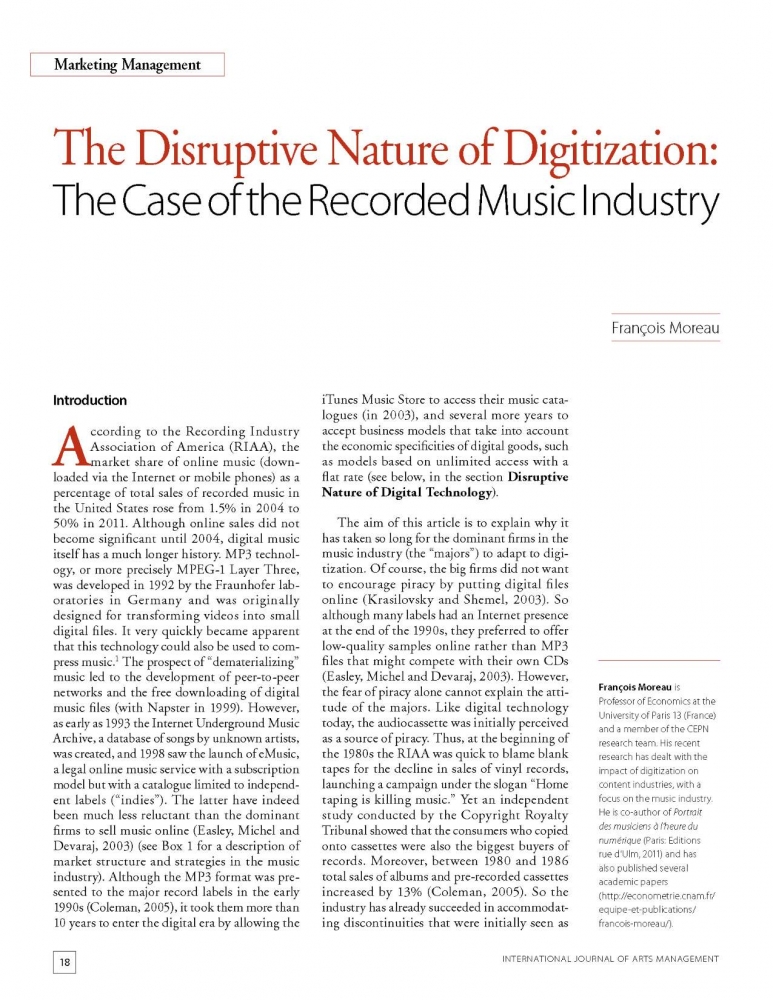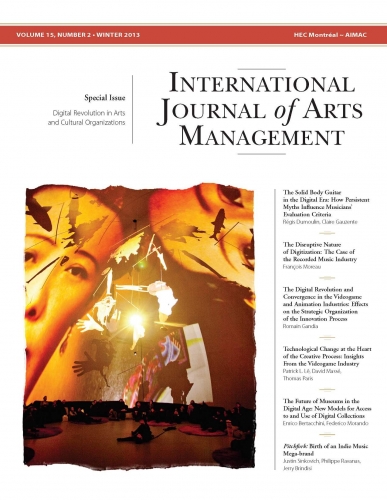The Disruptive Nature of Digitization: The Case of the Recorded Music Industry
Produit: Article
21,00 $ CA
François Moreau
François Moreau is Professor of Economics at the University of Paris 13 (France) and a member of the CEPN research team. His recent research has dealt with the impact of digitization on content industries, with a focus on the music industry. He is co-author of Portrait des musiciens à l’heure du numérique (Paris: Editions rue d’Ulm, 2011) and has also published several academic papers.
ABSTRACT
This article draws on the theory of disruption to analyze the impact of digital technology on the recorded music industry and to explain the delay of dominant firms in reacting to this technological discontinuity. The author shows that digitization matches the characteristics of disruptive innovation as described in the literature. He explains why established firms initially paid little heed to an innovation leading to a product (digital music files) that is cheaper and poorer in quality than their existing product (CDs) and ill-suited to mainstream consumers. The reaction of these firms has been typical of the behaviour of companies facing disruptive innovation. Confronted with an innovation that they see as more of a threat than an opportunity, incumbent firms have found it extremely difficult to accept the need for a radical rethinking of their business model.
KEYWORDS
Recorded music industry, digitization, disruption
RÉSUMÉ
Cet article s’appuie sur la théorie de la rupture pour analyser l’impact de la technologie numérique sur l’industrie de la musique enregistrée et expliquer le retard pris par les firmes dominantes pour s’adapter à cette discontinuité technologique. Il montre tout d’abord que la technologie numérique présente les caractéristiques d’une innovation de rupture telles qu’elles sont décrites dans la littérature. L’auteur explique également pourquoi les principales maisons de disques ont initialement considéré comme peu attrayante une innovation qui conduisait à un produit (les fichiers numériques musicaux) moins cher et de moins bonne qualité que le produit existant (les CD) et de surcroît peu adapté à leurs consommateurs principaux. La réaction de ces firmes a été caractéristique du comportement d’entreprises confrontées à une innovation de rupture. Face à une innovation qu’elles considéraient plus comme une menace que comme une opportunité, les firmes en place se sont révélées très réticentes à accepter une profonde remise en cause de leur modèle d’affaires.
MOTS CLÉS
Industrie de la musique enregistrée, technologie numérique, rupture
RESUMEN
Este artículo se apoya en la teoría disruptiva para analizar el impacto de la tecnología digital sobre la industria discográfica y explicar el retraso de las empresas dominantes en adaptarse a esta discontinuidad tecnológica. En primer lugar, se demuestra que la tecnología digital presenta las características de una innovación disruptiva tal como descrita en las publicaciones existentes. El autor también explica porqué las principales compañías disqueras en un principio vieron como poco atractiva una innovación que llevaba a un producto (los archivos de música digital) de menor costo y de menos calidad que el producto existente (los CD) y además mal adaptado a sus consumidores principales. La reacción de estas compañías fue característica del comportamiento de las empresas que se ven ante una innovación disruptiva, ante una innovación que consideran más bien una amenaza que una oportunidad. Las compañías existentes han mostrado una gran renuencia a aceptar un profundo cuestionamiento de su modelo comercial.
PALABRAS CLAVE
Industria discográfica, tecnología digital, disrupción

